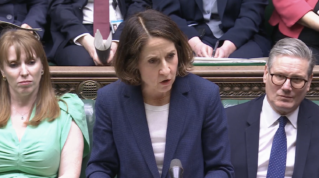Docking benefits and subsidising wages are among ideas being considered by ministers to get jobless young people into work, reports suggest.
According to The Sunday Times, the government is considering “major reforms” such as benefit sanctions if people reject education or training under Labour’s promised “youth guarantee”.
And Sky News this week reported claims that wage subsidy programmes are being mooted following concerns that tax rises introduced in last month’s Budget will dent job creation.
Getting Britain working
Labour is expected to publish a white paper entitled ‘Get Britain Working’ next month that sets out how the Work and Pensions, Education and Health and Social Care departments will raise the country’s employment rate from 74.8 to 80 per cent.
Quarterly statistics released yesterday reveal the number of young people who are not in education, employment or training (NEET) hit 946,000, up 8 per cent on the previous quarter.
This accounts for an estimated 13.2 per cent of 16 to 24 year olds in the UK from July to September.

Ahead of the white paper, the only policy announcement designed to address NEET rates has been a £240 million package for metro mayors and several unidentified English ‘trailblazer’ areas.
That cash will reportedly “streamline” local skills, work and health services and test “early interventions” that target specific barriers to work faced by the long-term unemployed of all ages – such as the estimated 2.8 million out of work due to long-term sickness.
NEETs soar by a fifth
Stephen Evans, chief executive of the Learning and Work Institute, said: “The number of NEETs has risen by 150,000 since the pandemic, a 20 per cent rise.
“The government’s upcoming ‘youth guarantee’ needs to include a step change in apprenticeships, education and help to find work.”
Barriers to economic activity are understood to be a combination of economic challenges, mental health struggles, lack of regional opportunities and access to education.
Disabilities and ill health are some of the “longest-running” factors, alongside being a lone parent and from a minority ethnic group, according to Naomi Clayton, director of policy and research at the Learning and Work Institute.
She told FE Week: “We know that rates of inactivity are far higher in some areas compared to others.”
A survey by Youth Employment UK said NEET rates are driven by a range of “interlinked factors” including high levels of anxiety when people leave education, a lack of belonging in communities, disruption from events such as the pandemic and regional inequalities.
There is also concern chancellor Rachel Reeves’ decision to hike national insurance contributions from April will worsen the NEET problem as it could hinder employers’ ability to recruit more staff.
Been here before?
Previous governments have already tried benefits sanctions and subsidised work programmes to boost youth employment rates.
For a couple of years during the pandemic the government ran the Kickstart scheme, which offered six-month paid work placements to those aged 16 to 24 who were on universal credit and deemed to be at risk of long-term unemployment – with the government picking up their wage bill.
Several other schemes are ongoing, including Restart and the Work and Health Programme, while others, such as Job Entry Targeted Support – aimed at the recently unemployed – ended last year.
Clayton said: “The system itself has been affected by the amount of policy churn, the different funding streams, and the short-termism.”
The evidence
Ben Gadsby, head of policy and research at Impetus, which funds organisations that support employment and education for disadvantaged groups, said there was already evidence about what works.
He revealed subsidised job programmes were ideal for young people who needed an employer to take a risk on them.
But he added: “Success will depend on how many non-subsidised jobs there are – one of the reasons there were fewer Kickstart places than planned is there were lots of non-subsidised jobs available.”
Gadsby said young people responded positively to supportive environments such as youth hubs, while benefit sanctions could “get in the way” of support on offer.
Minister for Employment Alison McGovern said the latest NEET figures were“yet more evidence of the significant challenges facing young people, particularly the pandemic generation who have not received the support they need to reach their full potential”.
She added: “Bold measures in our Get Britain Working white paper will turn this around. We will introduce a Youth Guarantee so every 18-21 year old in England is earning or learning while we transform job centres and introduce new health, work and skill plans to give everyone – including our young people – the support they need to build a better life.”

















Your thoughts